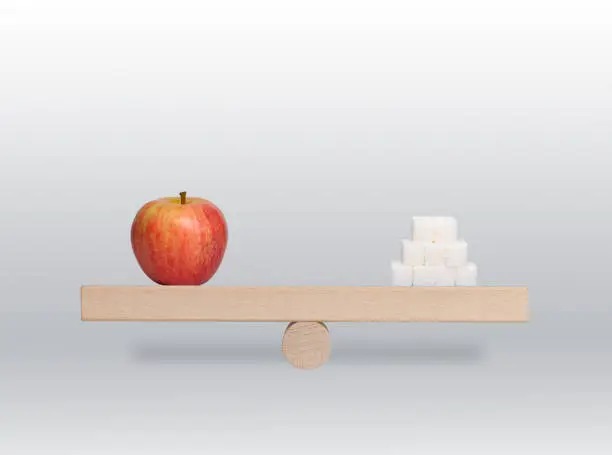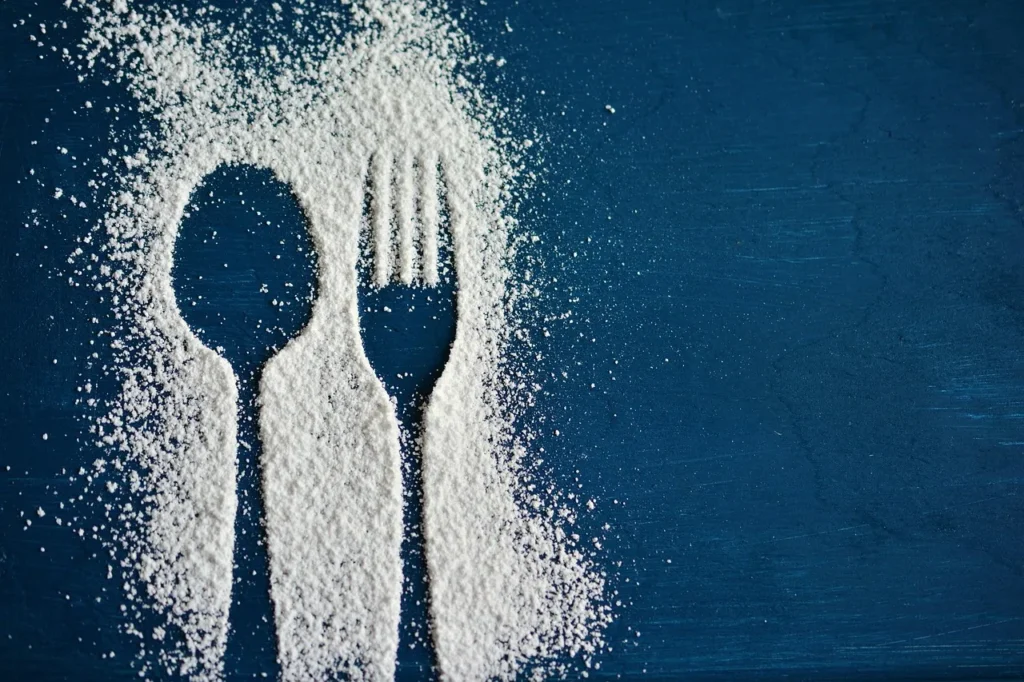Introduction
In contemporary eating habits, sugar is often seen as a delightful ingredient, yet consuming too much can slowly harm your well-being. Many people inadvertently exceed their daily sugar intake because of hidden sugars present in processed foods, drinks, and sweets. The World Health Organization (WHO) recommends that adults keep their daily caloric intake from sugars to under 10%, with the ideal aim of staying even lower than this level.

You may still enjoy your favorite meals and keep your blood sugar levels in check by using these eight secret techniques. Covered are the exact daily intake of sugar, the difference between natural and added sugar, and simple methods to cut back without feeling deprived. By the conclusion, you will be confident enough to make better choices for yourself and your family.
Understand the Recommended Sugar Intake
Understanding how much sugar you can consume each day is the first step to properly managing it. Although the majority of health authorities offer explicit recommendations regarding sugar intake, many people are unaware of how quickly sugar accumulates.

Why Sugar Limits Matter
Diabetes, heart disease, weight gain, and energy crashes are all associated with too much sugar. Maintaining a healthy sugar limit lowers long-term health risks and stabilizes blood sugar levels.
Global Recommendations at a Glance
- WHO: Less than 10% of daily caloric intake comes from added sugar.
- How much sugar should a woman consume daily? ≤ 25 grams, or 1/2 teaspoon.
- Men’s allowance for sugar is ≤ 36 grams (9 teaspoons).
- Even less for kids, depending on their calorie requirements and age.
Table: Daily Sugar Limit Adults vs Children
| Group | Maximum Sugar Intake Per Day | Teaspoons (approx.) |
| Women | 25 g | 6 tsp |
| Men | 36 g | 9 tsp |
| Children (2–18) | 25 g or less | 6 tsp |
Key takeaway: It’s easier to monitor and cut back on sugar once you know how many grams you should consume each day.
Spot Hidden Sources of Added Sugar Per Day
Sugar isn’t just found in desserts. Many manufactured goods include hidden sugars under other names. By being aware of these, you may drastically reduce the amount of sugar you consume each day.

Common Hidden Sources
- Cereal for breakfast
- Yogurts with flavor.
- Dressings and sauces.
- Bars of protein and granola
List of Sneaky Sugar Names
- Corn syrup with high fructose
- The maltose
- Dextrose
- Crystals made from cane juice
- Malted barley.
Foods High in Hidden Sugars
| Food Item | Sugar Content (per serving) | Healthier Swap |
| Flavored yogurt | 18 g | Plain yogurt + fresh fruit |
| Energy drink | 27 g | Sparkling water + lemon |
| BBQ sauce (2 tbsp) | 15 g | Homemade tomato-based sauce |
Pro tip: To keep daily added sugar intake within safe bounds, always read nutrition labels.
Balance Natural Sugar vs Added Sugar
Sugars are not all created equal. You can make better decisions if you know the difference between natural and added sugars.

Natural Sugar: The Healthier Kind
- Present in dairy products, fruits, and vegetables.
- contains vitamins, minerals, and fiber.
- Fruit sugar, for instance, digests more slowly and is less toxic.
Added Sugar: The Risky Kind
- incorporated into meals, during preparation, or when being processed.
- provides energy but lacks essential nutrients.
- increases the likelihood of cardiovascular problems, diabetes, and weight gain.
Natural vs Added Sugar
| Source | Type of Sugar | Impact on Health |
| Apple | Fructose | Healthy with fiber and vitamins |
| Soda | Sucrose/HFCS | Empty calories, blood sugar spike |
| Milk | Lactose | Nutritious, contains calcium |
Key insight: Fruit sugar intake is not strictly capped, but added sugars should always be kept to a minimum.
Track How Many Grams of Sugar Are Healthy Per Day
A lot of people don’t realize how much sugar they eat. One effective strategy for maintaining the healthy sugar limit is tracking.

Easy Tracking Tips
- Make use of food tracking applications.
- Take note of the serving sizes listed on labels.
- Four grams is equal to one teaspoon.
Quick Checklist for Tracking
- Establish a daily sugar target for yourself.
- Keep a food and snack journal.
- Keep an eye out for hidden sugars in beverages.
- Celebrate each week’s progress.
Sugar Conversion Guide
| Grams of Sugar | Teaspoons | Example Food Item |
| 4 g | 1 tsp | 1 teaspoon honey |
| 12 g | 3 tsp | Small chocolate bar |
| 20 g | 5 tsp | Sweetened cereal |
Action step: It’s easier to read labels and prevent health hazards when you know how many grams of sugar is healthy each day.
Reduce Daily Sugar Intake Safely
It’s not necessary to completely give up sweetness to reduce sugar intake. Reducing daily sugar consumption without experiencing deprivation is the aim.

Practical Swaps
- Replace soda with infused water.
- Use cinnamon in place of sugar for flavor.
- Choose whole fruit instead of fruit juice.
Numbered Steps for Safe Reduction
- Start by decreasing the sugar you add to your coffee or tea.
- Transition to your preferred foods that do not contain added sugar.
- Opt for healthier desserts like yogurt topped with fruit.
- Save sugary snacks for special occasions only.
Smart Sugar Swaps
| Instead of… | Try This… | Benefit |
| Soda | Sparkling water with lime | Zero added sugar |
| Sugary cereal | Oats with berries | Fiber + nutrients |
| Ice cream | Frozen banana “ice cream” | Naturally sweet, lower sugar |
Result: You can still enjoy sweet flavors while reducing your risk of developing diseases linked to sugar.
Manage Sugar Allowance for Women and Men

Allowance for Sugar for Women
- Sugar needs are influenced by age, gender, and degree of exercise. Knowing your daily sugar limit as an adult might help you tailor your diet.
- Sugar Allowance for Women
- What amount of sugar is advised for ladies to consume each day? 25 g, or roughly 6 teaspoons.
- Weight gain and hormone instability are increased by excess.
Allowance for Sugar for Men
- Men’s daily allowance of sugar is around 36 g (9 tablespoons).
- Consuming large amounts of sugar raises the risk of heart disease and liver issues.
Gender-Based Daily Sugar Allowance
| Gender | Grams of Sugar Per Day | Teaspoons | Notes |
| Women | 25 g | 6 tsp | Lower due to metabolism |
| Men | 36 g | 9 tsp | Higher but still limited |
Key point: Following these recommendations guarantees safe sugar consumption for both men and women.
Learn What Happens If You Eat Too Much Sugar Daily
Consuming a lot of sugar each day over time can pose major health risks.

Short-Term Effects
- Crashing energy
- A rise in appetite
- Mood fluctuations.
Long-Term Risks
- Diabetes type 2
- Heart conditions
- Liver fatty disease
- The metabolic syndrome and obesity
Health Risks of Excess Sugar
| Health Risk | How It Develops | Long-Term Impact |
| Diabetes | Insulin resistance | Lifelong management needed |
| Heart disease | High triglycerides | Risk of heart attacks |
| Fatty liver | Excess fructose storage | Liver damage over time |
Reminder: Maintaining a healthy daily sugar intake significantly lowers these risks.
Build Lifelong Habits to Maintain a Healthy Sugar Limit
Developing habits rather than using short-term solutions is the key to long-term success.

Daily Habits That Work
- Make protein and fiber-rich, well-balanced meals.
- To lessen sugar cravings, stay hydrated.
- Get enough sleep because sugar cravings are heightened by fatigue.
Habit-Building Checklist
- Prepare wholesome snacks in advance.
- Keep sugary treats out of sight.
- Give yourself a reward when you make progress.
- Teach family members to succeed in the long run.
Healthy Habit Substitutions
| Old Habit | New Habit | Why It Works |
| Sugary snack break | Fruit + nuts | Balanced energy |
| Soda with lunch | Water or herbal tea | Cuts calories + sugar |
| Dessert every night | Fruit twice a week | Reduces sugar cravings |
Final insight: You can enjoy sweetness while adhering to your recommended sugar intake by following these easy steps.
FAQs
1. How much additional sugar is safe to consume each day?
Most experts recommend limiting daily intake of added sugar to less than 25 g for women and 36 g for men. Remaining below this lowers the risk of heart disease and diabetes.
2. How many teaspoons of sugar should one consume each day?
Six teaspoons for women and nine teaspoons for males are typically regarded as safe. The likelihood of health problems increases significantly after this.
3. What is the daily limit for sugar intake?
Indeed. According to WHO guidelines, no more than 10% of daily calories should come from sugar. For most individuals, that is about 50 g (12 teaspoons), although less is better.
4. What is the daily limit for fruit-based sugar intake?
There is no strict limit on the amount of sugar in fruit because it contains fiber and minerals. A surplus of fruit juice can still raise blood sugar levels, so balance is crucial.
5. If you ate too much sugar every day, what would happen?
Regularly eating a lot of sugar can raise your chance of acquiring chronic illnesses, lead to weight gain, and induce insulin resistance. It causes energy dips and bad oral health as well.
Conclusion
Limiting the amount of sugar you eat each day is one way to enhance your health. Understanding guidelines, recognizing hidden sugars, balancing natural and added sugars, measuring grams, lowering safely, understanding allowances, avoiding excess, and developing habits are the eight tactics that will help you remain within a healthy sugar limit without sacrificing enjoyment.
You may make simple, consistent adjustments today to protect your long-term health tomorrow. If you start by recording your next meal and make one simple modification, you’ll be surprised at how quickly your sugar intake improves.
Remember that knowledge and action are the first steps to a healthy lifestyle, and share this article with a friend who needs help reducing their sugar intake.



